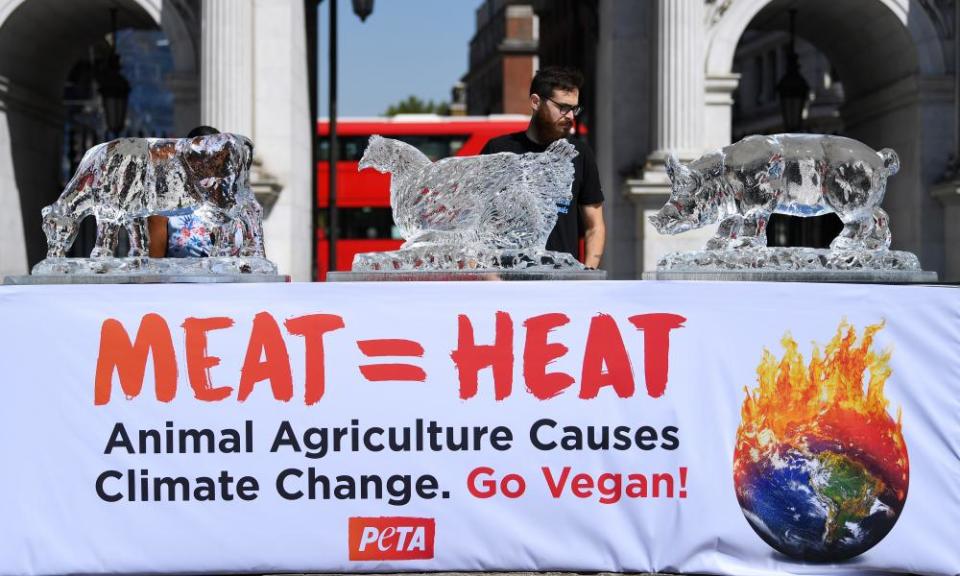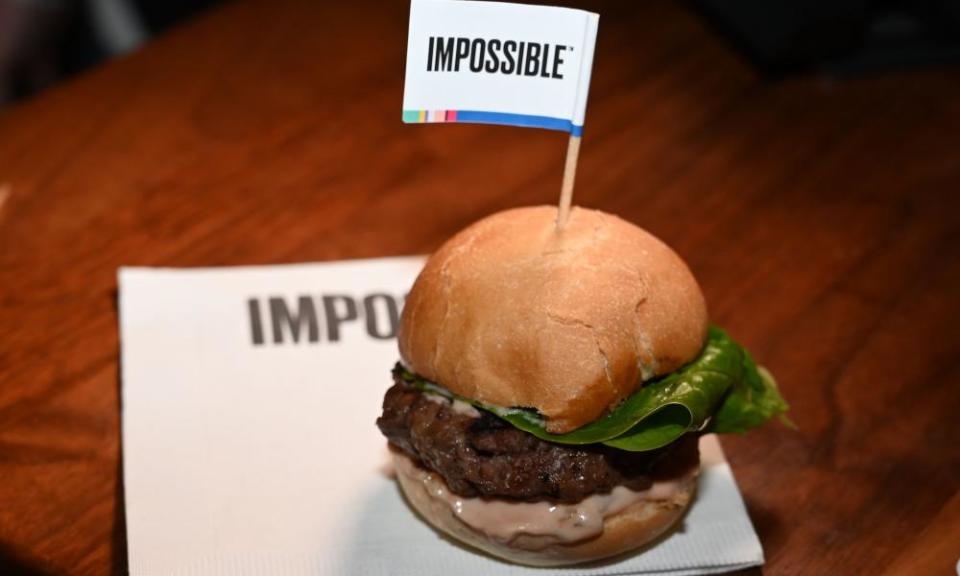How can the UK reduce meat consumption and cut emissions?

The future of farming is in the spotlight as we try to shift our relationship with the natural world. Globally, 83% of farmland is taken up by livestock, and many scientists and campaigners are arguing for an overhaul of meat and dairy consumption to free up more land for nature and reduce emissions.
What’s the trend on meat consumption in the UK?
There appears to be a slight downward trend in meat-eating but figures are still high. A report from last year found Britons have reduced meat consumption by 17% in the past decade (although the authors note this study is based on how much people say they’re eating, and other data suggests people eat more meat than they think they do). The availability of plant-based alternatives – which have gone from being niche to widely available in most large supermarkets and restaurants – has driven this decline. This is a big win for the environment. A report from Boston Consulting Group (BCG) found investing in plant-based alternatives is one of the best way to cut emissions. From a health point of view, these highly processed alternatives could come with their own problems. Prof Lindsay Jaacks, personal chair of global health and nutrition at the University of Edinburgh, likens them to “nicotine patches”.
There is no other country with similar levels of meat consumption to the UK which has successfully cut down. Across Europe, the politics of meat consumption is becoming increasingly heated, and globally, meat consumption is higher than ever.

Can’t you just provide people with information on the impacts of meat?
Not really. Dietary guidelines, for example from the Lancet report, do not change individual behaviour, studies have shown. This is because of the “meat paradox” – people understand and oppose what meat consumption does to the environment (and their health) but it doesn’t seem to impact how much they actually eat.
Generally, food choices are intuitive and people are not thinking about the climate crisis when browsing supermarket shelves. Dr Filippo Bianchi, who researched meat consumption while at the University of Oxford, described food choice as being governed by our impulsive “Homer Simpson brain”, not our rational “Einstein brain system”.
What is an effective way of getting people to cut down on meat?
A meat tax, or “sin taxes” would be most effective yet almost all government subsidies promote meat consumption. In the UK, the best evidence of how this might work is the tax on the soft drinks industry. It mainly involved manufacturers reformulating products, and didn’t put the burden on the consumer. A meat tax would mainly incentivise manufacturers to put less meat in products (eg, a sausage might have 60% meat instead of 70%) but there is no government appetite for it.
There are many reasons for this, including lobbying from interest groups saying it would damage the domestic farming sector. Neoliberal governments also have a tendency to believe the market will internalise health and environmental costs if better information is provided, and the government does not want to appear to be a “nanny state”, says Dominic Moran, professor of agricultural and resource economics from the University of Edinburgh. There is also concern the burden of taxes falls disproportionately on lower income groups. “But this isn’t inevitable,” says Moran.
What about cutting government subsidies for meat production?
Ending subsidies that support meat production could have a similar impact as a meat tax on the end product. There was a successful government-led initiative in Finland in the 1970s called the North Karelia Project, which involved ending dairy subsidies and working with farmers to grow berries and rapeseed instead. The UK is now moving away from subsidising farmers to rear animals to creating space for nature on farms. However, there is a risk that we just import cheaper meat from abroad to make up for it.
What about regulating adverts, similar to the tobacco industry?
Related: UK could miss net zero target if eco-friendly farming scheme is delayed, warns report
If you make it easier for companies to advertise products that are better for the environment, you expose fewer people to products which are bad for the environment. Good in theory, but it would be really hard to work out what should be regulated because unlike tobacco, eating meat is not all bad for people, it’s just the quantity it is being eaten in. It would also be hard to know what needs to be regulated – would it just be processed red meat, or chicken too? What about organic?
What about labelling?
A paper reviewing environmental labels found they did encourage people to purchase more sustainable products. “Until eco-labels are mandatory, I don’t think we’ll see meaningful shifts in the carbon footprint of purchases in the UK,” says Jaacks. It is traditionally thought of as a consumer-facing intervention, but the biggest impact is that it’s likely to push manufacturers to make healthier food. Like regulating adverts, it would be difficult to work out what would be considered “good” and “bad” – for example is all red meat bad? Or do we differentiate between types of production of red meat?
How could supermarkets and restaurants help?
The way food is presented in supermarkets and restaurants can shift consumption at scale, studies have shown. Supermarkets could remove meat from the impulse buy section at the end (for example, replace meat-based with plant-based) and stop meat promotion deals. Keeping meat out of sight – such as putting it on lower shelves – also seems to work, studies suggest. Making sausages on supermarket shelves smaller caused a 13% drop in meaty purchases, one study found.

Putting less meat on menus also means people eat less of it. A study found that reducing the amount of meat in restaurant meals by 28g made the average person consume less meat without reducing their enjoyment of their meal. According to research published in the British Medical Journal, interventions that alter the availability of food have “substantial effects on consumer selection” with no evidence of adverse effects.
What about in institutions such as schools and universities?
In schools and universities, vegetarian meals could become the default option. This normalises the consumption of plant-based products and also has the power to change social norms, as well as convincing people who wouldn’t have bought meat alternatives that they actually like them. This is already happening in public sector universities, hospitals and care homes which have pledged to cut the meat they serve by 20%. Shifting consumer behaviour will impact other actors in the food chain and could influence wider social and environmental systems.
What about reducing emissions from livestock?
There are many well-documented environmental and health impacts of eating meat. Researchers are hoping to address one of these issues: the emissions from beef production. A feed additive that can be put in cow food could reduce emissions by 30%, according to researchers, and it has been approved for use in the EU. Most often cows are bred because they fatten well, or produce lots of milk, but researchers are also looking to selectively breed cattle with lower methane emissions. According to research – which is still in its infancy – this could reduce emissions by 17% in one generation. “Relying on consumers to change what they eat in order to deal with the climate emergency sounds like a risky strategy, because what happens if they don’t? This is where technology comes in,” says Prof Mick Watson, a bioinformatician from the Roslin Institute at the University of Edinburgh.
• Find more age of extinction coverage here, and follow biodiversity reporters Phoebe Weston and Patrick Greenfield on Twitter for all the latest news and features

 Yahoo Movies
Yahoo Movies 
